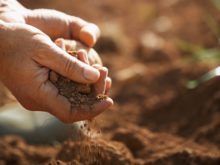The soil, a resource to protect
As stated in Article 3 of the World Soil Charter drawn up by the FAO, “soils are a key resource, fundamental to the creation of a range of goods and services necessary for ecosystems and human well-being“.
As stated in Article 3 of the World Soil Charter drawn up by the FAO, "soils are a key resource, fundamental to the creation of a range of goods and services necessary for ecosystems and human well-being".
A key resource and also non-renewable one.
Soil degradation conditions, which are responsible several factors for, make clear the course of action to be taken, putting us in a position of recovery and protection against the largest carbon reserve on earth.
Biodiversity and soil
Soil is able to guarantee to humanity goods and services that are essential for the survival of ecosystems, and, in this regard, protection and proper management of this resource are necessary.
What makes soil a valuable and non-renewable resource? Soil degradation, combined with:
- agricultural industrialization processes,
- excessive fertilisation (increasing soil salinity),
- the non-rational use of agrochemicals.
and finally, the effects of climate change: a critical scenario that puts the spotlight on greater responsibility towards the resource.
In this case, the importance of biodiversity and, consequently, the measures to be taken to contribute to the regeneration of agricultural land and the refurbishment of its health is outlined.
Recognising the importance of healthy soils is a key step in understanding that this is the key to meeting the needs of food, biomass (energy), fibre, feed and other products and to ensuring essential ecosystem services around the world.
How can we contribute to respect the soil?
Soil is the vital resource of much of our food and provides other ecosystem services, such as water purification and nutrient cycle, climate regulation and flood prevention.
Soil deterioration is also partly due to poor management of the nutrients which are supplied to it. In this case, the misuse or under-use of fertilizers proves that improper use of them generates inefficiencies in food and nutrition safety issues.
For this reason, in DEMA we study solutions to apply nutrients respecting the actual needs of crops and ensuring safety. By producing micro-granular fertilizers with localized action, we avoid:
- Wasting of resources and raw materials,
- Providing soil with an excessive content of unnecessary nutrients,
- Deterioration of groundwater intended not only for agricultural purposes.
Microgranular and organic solutions
Our philosophy embraces precision nutrition, which can be the most prudent solution for field crops, as it is able to ensure high performance by allowing a substantial reduction in doses compared to traditional granular. That results in a greater respect for the needs of the land.
In addition, we provide organic microgranular fertilizers that meet the needs of organic farming: formulated and produced with raw materials allowed in organic farming, we are able to promote a sustainable food supply chain starting from the field.

